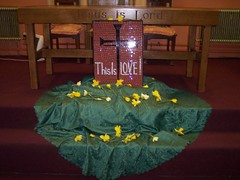Lees Street Amateur and Musical Dramatic Society recently presented a play about the life and diary of Anne Frank.
It was a moving way of bringing to our attention the wisdom and courage of the young writer, Anne, a Jew, who hid with her family during the Nazi occupation of the Netherlands, though ultimately they were betrayed and she died in Bergen-Belsen, just weeks before the war ended. But it also brought to mind the situations where persecution and hatred persist.
Anne wrote this: “How wonderful it is that nobody need wait a single moment before starting to improve the world.” It is quite a thought for us. So what about the Anne Frank Declaration:
“Anne Frank is a symbol of the millions of children who have been victims of persecution.
Anne’s life and death show us what can happen when prejudice and hatred go unchallenged.
And because prejudice and hatred harm us all, we declare that:
We will stand up for what is right and speak out against what is unfair and wrong.
We will try to defend those who cannot defend themselves.
We will strive for a world in which our differences will make no difference –
a world in which everyone is treated fairly and has an equal chance in life.”
Let’s not just think about it
Sunday, April 29, 2007
Monday, April 09, 2007
Easter: putting us together again
On Good Friday, we marked the way in which the breaking of Jesus' body was mirrored in the breaking of his community. This was signalled most clearly by Peter's denial of his Teacher - he was cutting himself off from 'the body of Christ'. And as Jesus died, we read that the women 'stood at a distance'. Others fled, or hid, and stayed silent. But Easter signals the healing of the body - just as Jesus is risen, so his community rises to new life. The disciples on the road to Emmaus start talking things through; they are open to the wisdom of an apparent outsider; they are hospitable again, despite their inevitable fears; they share bread; and they go and share good news, once their eyes are 'opened'. The body is being restored! And so it is with Peter - in John's Gospel, chapter 21, Jesus gives him chance to put right each of his three denials, and he re-commits to feeding Jesus' sheep ... the journey can go on; for the body is restored. This is good news: Even through the very worst things, there is hope as God chooses and uses broken and fragile people to be agents of good news. So it is that, in 1 Corinthians 15 (vs 12-20, 42-44), we are encouraged because 'what is sown in weakness is raised in strength, what is sown in dishonour is raised in glory, what is sown physically is raised spiritually.' The risen Christ is 'the first-fruits' of this hope: so there is more to come ... each time we are broken, we can be restored, to go on and share good news. Otherwise, we are left with nothing; so thank God, who puts us together again, and again, to carry on being compassionate, forgiving, as wounded travellers seeking peace and justice together.
Monday, April 02, 2007
Abolition Act - act against slavery again

One of the best things in the resources for the commemoration of the abolition of the British Empire's slave trade (in 1807) has been the information about the lesser known "abolitionists". William Wilberforce did not achieve it on his own. We have rediscovered Olaudah Equiano, the former slave who travelled Britain, telling his story. We have rediscovered Harriet Tubman who escaped slavery but returned to help free a further 300 people through the 'Underground Railroad', the network of secret contacts and safe houses. Also there was Hannah More, a British writer who inspired many women to join the movement. They remind us of Shiphrah and Puah in the Book of Exodus, chapter 2: Egyptian midwives who undermined the Pharaoh's instructions to kill the newborn male Hewbrews. For freedom was not won by Moses acting alone! So, on 25th March, the anniversary date, Lees Street looked at the call of Moses: faced with a burning bush, revealing God's presence, he 'hid his face'. How true that we want to hide our faces from the realities of slavery - which still goes on - and from God's call to us to act, again and again. But faced with God's call, the God who has been there throughout the ages, the God who hears the people's cries and seeks a way for freedom to be brought into being, Moses found himself saying, "Here I am." So we too must hear the cries, hear the call, and see where we are ... here we are! So we made our paper chains, symbols of enslavement, joining with other churches doing the same thing, and we signed the 'stop the traffik' petition, and our remembrance of one 'abolition act' became a commitment to abolition today. Moses and Wilberforce did not act alone; Shiphrah, Puah, Equiano, Tubman, More, countless others ... and now, hopefully, we add our own names to the movement for human freedom, again and again.
Click on these links for more info. Set All Free or Stop the Traffik
Subscribe to:
Posts (Atom)

